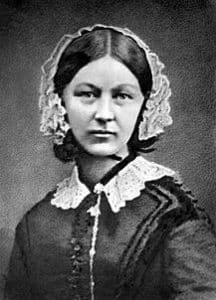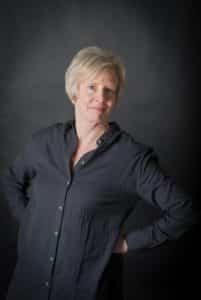Clare Cable, Chief Executive and Nurse Director

Florence Nightingale

Clare Cable
Today we are celebrating Florence Nightingale’s 200th birthday. Florence Nightingale was instrumental in founding the Queen’s Nursing Institutes across the UK. The Scottish Institute started life on April 1, 1889 with Miss Pauline Peter as the first superintendent, and only three nurses. In a letter to Miss Peter, Florence Nightingale wrote: “I most earnestly hope that you are beginning under the conditions you and we wish for and bid you success from the bottom of my heart. God bless you.”
Those first pioneer district nurses were seen not only as skilled carers for the sick, but also as social reformers.
130 years later, the Queen’s Nursing Institute Scotland is still here and thriving. Those first pioneer district nurses were seen not only as skilled carers for the sick, but also as social reformers. Florence Nightingale saw the Queen’s district nurses as having a key role in supporting a deeply disadvantaged population.
In her view ‘the aim of the nurse must not only be to alleviate but to educate and she can only do this by becoming the friend and confidante of the people for whom she is working. She must never criticise, she must never scold, she must never lay down the law… If she ever does this, they will wish only that she should never come into the house again. But she must quietly put things right by doing them herself, and when the family see her way is better, they will follow her example… It is quite useless to send round and lecture because people don’t like being lectured. Let someone go and live among the women and become their friend.’
The language may feel a little dated, but at its heart is a deep commitment to working alongside individuals, families and communities to address inequity and injustice and that is at the heart of our mission today. Community nurses and midwives all over Scotland are advocating for our most marginalised groups, those who have been hit hardest by the pandemic. They are working closely with other agencies, volunteers and food banks ensuring that those in poverty have access to food and essentials. Health visitors are safeguarding children and working with skilled sensitivity to support families where lock down has increased the likelihood of domestic violence. Mental health nurses, working across settings are seeing increased stress, and distress.
As we transition through these times of uncertainty, as nurses we must step up and make our voice heard.
Florence Nightingale was an innovator. It was in a time of emergency that she stepped into leadership just as today we are seeing many examples of nurses as leaders demonstrating innovation, flexibility and tenacity in response to the COVID19 outbreak. However, the challenge to nurses is to maintain some of the good things that have been implemented during this period. As we transition through these times of uncertainty, as nurses we must step up and make our voice heard.
Florence Nightingale was dogged in her influencing. She was a woman who valued evidence; she collected data systematically and presented it unapologetically. We need to do just that. We collect much information routinely but sometimes don’t recognise the potential impact of that data, and so miss the opportunity to present it to decision makers. Now is the moment to speak truth to power and advocate for what is needed both in the present and going forward.
The QNIS Catalysts for Change programme, in partnership with The National Lottery Community Fund, has addressing inequalities at its heart. It is currently postponed as many nurses are deployed to other services and ‘development projects’ are on hold. However, that spirit of being a catalyst and a change maker is not about projects, it’s a state of mind.
Breathe deeply, stay curious and unleash your inner social reformer.